Kidney Stones – Symptoms, Causes, Types, and Treatment
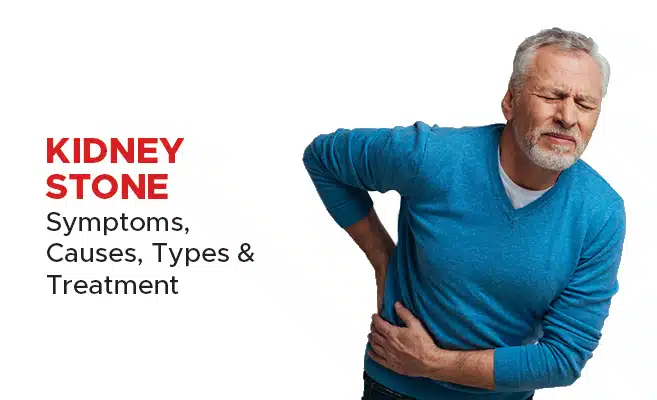
Kidney stones are a painful and common health issue impacting millions of people globally, and India is no exception. According to recent reports, the incidence of kidney stones in India is rapidly increasing, with an estimated 10-12% of the population suffering from this illness. The symptoms of kidney stones can range from mild to severe, and if left untreated, they can lead to severe complications.
Knowing the symptoms, causes, types, and treatments of kidney stones is vital to effectively prevent and manage this condition.
In this blog, we will explore in depth the various elements of kidney stones. We will cover everything from the common type of kidney stones to the various causes of kidney stones. We will also discuss kidney stones treatments, including medical and home remedies. Whether you have been diagnosed with kidney stones or are just looking to educate yourself on the kidney topic, this blog is an excellent resource for you.
What are Kidney Stones?
Kidney stones are tiny, hard mineral deposits that develop inside the kidneys. They are made up of waste materials such as calcium, oxalate, and phosphorus that have collected in the urine. Over time, these waste materials can form crystals and expand into stones. The stones can range in size from a tiny grain of sand to a golf ball and can cause extreme pain and discomfort when they move through the urinary tract.
What Are the Symptoms of Kidney Stones?
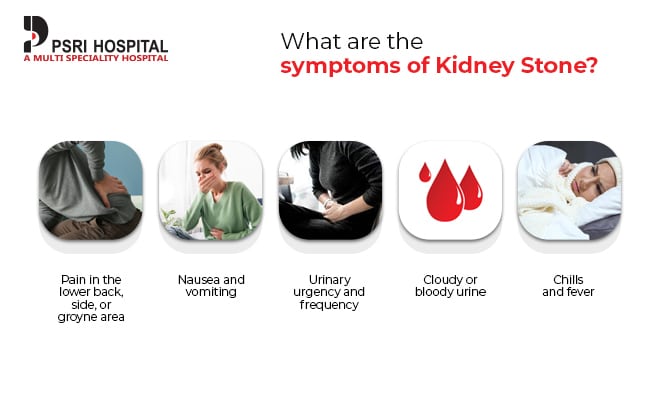
The symptoms of kidney stones can differ depending on the size and location of the stones, as well as the individual’s health. Some common kidney stones symptoms include:
- Pain in the lower back, side, or groin area: This pain can be excruciating and may come in waves.
- Nausea and vomiting: Some people may feel unwell in the stomach or even vomit due to the discomfort caused by kidney stones.
- Urinary urgency and frequency: A person may feel a strong urge to urinate often and may also experience discomfort or burning during urination.
- Cloudy or bloody urine: The existence of stones in the urinary tract can cause the urine to become cloudy or tinged with blood.
- Chills and fever: If a kidney stone causes an infection, a person may experience a cold and a fever.
It is important to note that not everyone with kidney stones will experience these symptoms, and some people may only have mild symptoms or none at all. If you suspect kidney stone symptoms, it is essential to see a healthcare provider for a proper diagnosis.
What are the Kidney Stones’s Causes?
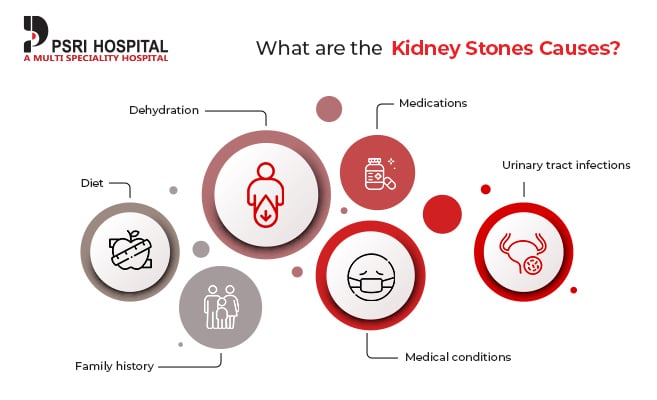
Kidney stones can develop as a result of several factors, including:
- Dehydration: When the body is dehydrated, the urine becomes concentrated, and minerals can form crystals that can ultimately develop into stones.
- Diet: A diet high in animal protein, salt, and sugar can raise the risk of forming kidney stones.
- Family history: A family history of kidney stones raises the risk of developing stones.
- Medical conditions: Certain medical conditions, such as gout, renal tubular acidosis, and hyperparathyroidism can also increase the risk.
- Medications: Some medications, such as diuretics and calcium-based antacids, can increase the risk of developing stones.
- Urinary tract infections: Chronic urinary tract conditions can also raise the risk of developing kidney stones.
It is essential to note that kidney stones’ causes are unknown in some circumstances. Regardless of the cause, it is essential to drink plenty of water and maintain a healthy diet to reduce the risk of developing kidney stones.
What are the Types of Kidney Stones?
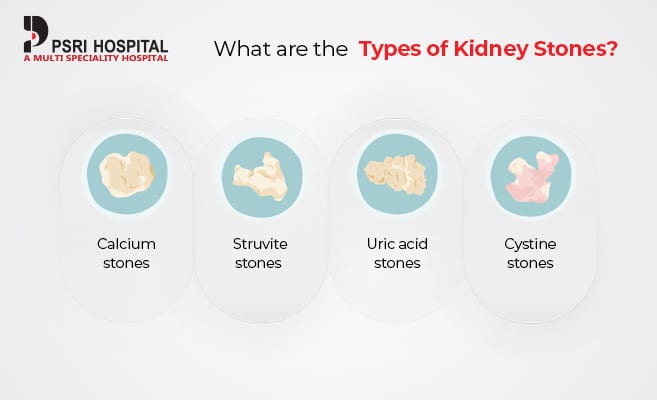
The types of kidney stones can play a role in pinpointing the cause and reducing the risk of future stones. If you pass a kidney stone, saving it for your doctor to analyze is a good idea.
The types of kidney stones include:
- Calcium stones – the most common type, usually made of calcium oxalate- can be affected by factors such as a high oxalate diet, extreme vitamin D intake, and metabolic disorders.
- Struvite stones – formed as a result of a urinary tract disease, they can grow large quickly with little warning.
- Uric acid stones – occur in those who have chronic diarrhea, eat a high-protein diet, have diabetes, or have metabolic syndrome, and can also be influenced by genetics.
- Cystine stones – are formed due to a hereditary disorder called cystinuria, which causes the kidneys to excrete too much of a specific amino acid.
Diagnosis of Kidney Stones
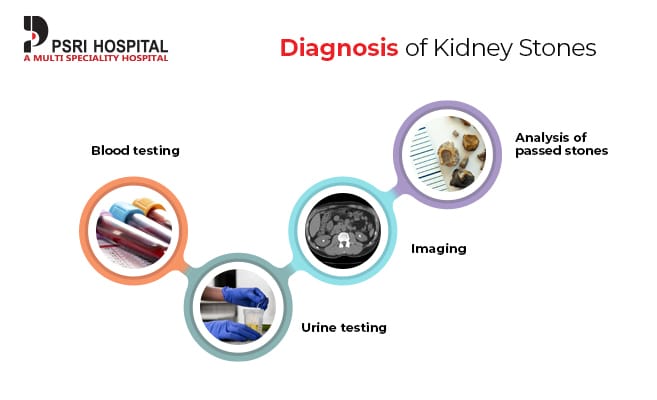
There are three standard methods used to do a diagnosis of kidney stones:
Blood Testing
Blood tests can indicate an excess of calcium or uric acid in your blood, and the results can be used to monitor your kidney health and check for other medical conditions.>
Urine Testing
A 24-hour urine collection test may determine if you are excreting too many stone-forming minerals or too few stone-preventing substances. This test may require two consecutive days of urine collection.
Imaging
Imaging tests, such as high-speed CT scans or ultrasounds, can show the presence of kidney stones in your urinary tract. While simple abdominal X-rays can be used, they are less effective and may miss small stones.
Analysis of Passed Stones
You may be asked to strain your urine to catch any stones you pass. Lab analysis of the stones will reveal their composition, which can help your doctor determine the cause and develop a plan to prevent future kidney stones.
Kidney Stone Treatments
After the diagnosis of kidney stones, your healthcare professional will first decide if you require therapy or not. It’s because when you urinate, some tiny kidney stones might pass from your body. But it can be excruciating. If your physician determines that you do need any treatment, your options include medications and surgery.
Medications
Your doctor may suggest the medicines for:
- Lessen the pain. An over-the-counter medication like ibuprofen or, if you’re in the emergency room, an IV narcotic may be advised by your healthcare expert. Medicines can also help in controlling nausea and vomiting.
- To help the stones pass, relax your ureter. Tamsulosin (Flomax®) and nifedipine (Adamant® or Procardia®) are two drugs that are frequently recommended.
It is best to get in touch with your doctor before using ibuprofen. When taking it during an acute kidney stone attack, this medication can increase the risk of kidney failure, particularly in people with a history of the renal disorder and other conditions like diabetes, hypertension, and obesity.
Surgery
To treat kidney stones, four different surgical techniques are available. The first three are minimally invasive, which indicates that the doctor enters your body by a slight incision or a natural opening (like your urethra).
- Ureteroscopy: A small instrument called a ureteroscope is inserted via the urethra, across the bladder, and into the ureter to perform ureteroscopy. This device displays the kidney stones before either retrieving them in a surgical “basket” or fragmenting them with a laser. Your urinary tract can then swiftly get-go of these tiny kidney stone fragments.
- Shockwave lithotripsy: You are positioned on a certain kind of surgical table or tub in this treatment. The water sends powerful shockwaves to the stone (s). The shockwaves smash the stones, making it more straightforward for them to exit from your body.
- Percutaneous nephrolithotomy: This treatment option is considered when other methods of removing kidney stones are ineffective due to factors such as the number of stones, size or weight, or location. The procedure involves making a small incision in the back, through which a tube is inserted directly into the kidney. The stones are then fragmented using an ultrasound probe and removed using suction, eliminating the need for any fragments to be passed. A urethral stent is usually inserted, which is removed after one week. Patients are usually required to stay overnight for observation after the procedure.
- Open stone surgery: This type of surgery involves making a longer incision, and it is significantly less common than minimally invasive procedures, occurring in only 0.3% to 0.7% of cases.
In conclusion, kidney stones can be a distressing and uncomfortable experience, but they can be diagnosed and treated effectively in best urology hospital of Delhi. It’s important to be aware of the kidney stone symptoms, such as severe pain in the back, side, or lower abdomen, and blood in the urine, to seek medical attention promptly.
By understanding the symptoms, causes, and treatments for kidney stones, individuals can work with their healthcare providers to develop an effective plan for managing this condition.
Conclusion
We hope our blog guides you well on kidney stone types, symptoms, and treatments. So, if you are suffering from kidney stone symptoms or want to get the best advice from doctors, PSRI Hospital can help you. It is a famous multispeciality hospital in Delhi with years of experience giving its patients the best possible treatments. So, get excellent kidney transplant treatment from us and live a healthy life.

 Book An Appointment
Book An Appointment Virtual Consultation
Virtual Consultation




